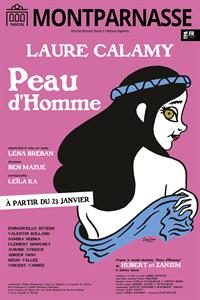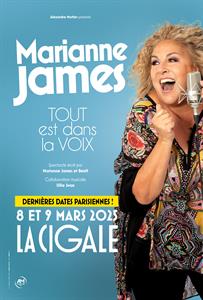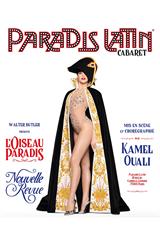
DV8 - To be straight with you
DV8 - To be straight with you
- De : Lloyd Newson
- Avec : Ankur Bahl, Dan Canham, Seke Chimutengwende, Ermira Goro, Hannes Langolf, Coral Messam, Rafael Pardilo, Ira Mandela Siobhan
Spectacle en anglais.
- Les questions de la tolérance, de la religion et de la sexualité
Trois ans après Just For Show, DV8 Physical Theatre revient au Festival d’Automne avec son nouveau spectacle, To Be Straight With You. Le nom même de ce collectif britannique issu du champ chorégraphique indique la conception qu’il a de la scène : son approche « physique », qui a au moins autant à voir avec la danse qu’avec la performance, a fait de DV8 l’un des pionniers d’un « théâtre de la rupture » qui remet en question le rôle du théâtre dans un contexte de production massive et de divertissement standardisé.
Au même titre que Forced Entertainment ou le Wooster Group, les artistes de DV8 excellent à mixer les matières, à mêler le documentaire et l’imaginaire pour mieux placer le spectateur en situation de confrontation. Les corps sont écrans en même temps qu’ils font écran, ils dévoilent autant qu’ils dérobent au regard ; autour d’eux, textes, images vidéo et films d’animation créent un univers à la fois radical et accessible, faisant souffler sur scène un vent de fraîcheur et d’audace.
Un univers, surtout, hautement politique, comme To Be Straight With You vient à nouveau en témoigner : prenant appui sur des dizaines d’heures d’enregistrement d’entretiens qu’ils ont réalisés avec des personnes ayant fait l’objet de persécutions en raison de leur orientation sexuelle ou de leur origine, Lloyd Newson et sa troupe cosmopolite sondent ici les questions de la tolérance, de la religion et de la sexualité.
- Foreword
There are three main reasons, or events, which prompted me to make To Be Straight With You, a work about tolerance/intolerance, culture, religion and homo/sexuality.
In the early 1990s, I went on a Gay Pride March which, that year, went through the predominantly Afro-Caribbean neighbourhood of Brixton. My then-boyfriend, who was Indian, and I were astonished at the level of abuse and hostility directed at us as we walked hand in hand down Brixton Road. I was struck by the fact that people who themselves are part of a minority, many of whom must have experienced racism and racist abuse first-hand, were so willing to be abusive towards another minority. Our research showed that many people within the Afro-Caribbean community hold strong religious beliefs, and not surprisingly, use religions texts to justify their negative attitudes towards homosexuality.
In 2006 Channel 4 Television screened a documentary called Gay Muslims. The programme interviewed 200 gay and lesbian Muslims living in Britain, and only one person out of the 200 was willing for their face to be shown on television. The resulting programme therefore comprised mainly of hand and feet close-ups. It is worrying that people living in a democratic country in the 21st Century are still frightened to be open about their sexuality because of potential reprisals within their own ethnic and religious communities. Currently the word ‘schism’ appears almost daily in newspapers when referring to the potential split within the Anglican Church over the issue of homosexuality. There are 38 Archbishops and Bishops that represent the Anglican Communion worldwide and a number of these have announced they will boycott the 2008 Lambeth Conference, hosted by the Archbishop of Canterbury, because invitations have been sent to more liberal bishops who condone homosexuality. Last year, the Anglican Mainstream, a network of traditional Christian organisations, sought exemption from the government’s Equality Act (Sexual Orientation) Regulations 2007, which attempts to prevent discrimination of gay people in the provision of goods and services.
Examples like these raise the question of how a society reconciles religious beliefs with human rights that should be available to everyone regardless of their sexual orientation, gender or race?
The themes behind this production are complex, sensitive and not easily translated into movement, so for the first time in DV8’s history I sought a writer, and/or an existing text, to help me structure the work. However, after six months of intensive searching, nothing I had read or seen adequately addressed the particular issues or theatrical forms I wanted to explore.
It seemed a more suitable and authentic approach would be to use first-hand, verbatim accounts of people directly affected by the issues of religion and homosexuality. For a number of reasons it was challenging to find people to interview – often simply because they were too frightened to tell their stories. We employed a full-time researcher, who found many of our interviewees through word of mouth, asylum organisations, human rights groups, youth groups and religious and political organisations. We also advertised in the press, leafleted in bars and clubs, and went to anti-gay protest gatherings. We interviewed 85 people living in the UK; men and women, some who are both religious and gay, some who have given up on one for the other, members of the clergy, human rights organisations and people opposed to homosexuality due to their religious beliefs. We also conducted street interviews (vox pops) in different areas of London, in which we asked passers-by how they felt about issues like gay marriage and the relationship between religion and sexuality.
Many of our interviewees, particularly from ethnic minority groups with strong religious ties, requested that their identities remain hidden, fearful of the consequences should their communities discover their sexuality. Despite the great gains in the law to protect gay people in this country, our interviews show how lesbians and gay men, if they choose to become visible, face intimidation or physical abuse. I hope that through this work audiences will become more aware of the lives of many people hidden under the veneer of a liberal and supposedly tolerant society. Every word spoken on stage comes directly from the interviewees and I would like to thank them for agreeing to let us tell their stories.
Lloyd Newson, Artistic Director, DV8 Physical Theatre, February 2008
Vous avez vu ce spectacle ? Quel est votre avis ?
Informations pratiques - Maison des Arts de Créteil
Maison des Arts de Créteil
Place Salvador Allende 94000 Créteil
- Métro : Créteil - Préfecture à 426 m
- Bus : Hôtel de Ville à 71 m, Centre Commercial Régional à 196 m, Métro Préfecture à 387 m
Plan d’accès - Maison des Arts de Créteil
Place Salvador Allende 94000 Créteil







